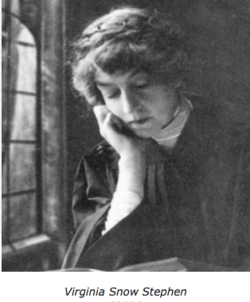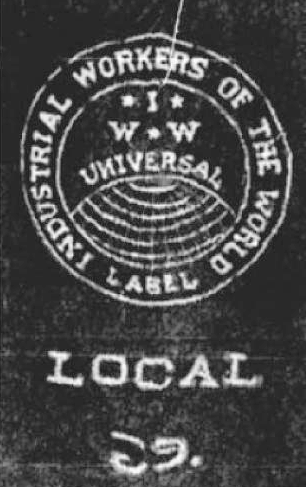There are no limits to which
powers of privilege will not go
to keep the workers in slavery.
-Mother Jones
Hellraisers Journal, Tuesday November 9, 1915
Salt Lake City – Grand Send-Off to Local I. W. W. President

On Sunday, November 7th, Local 69 of the Industrial Workers of the World bid good-bye to their President, Roy Joseph Horton. Ed Rowan and Mrs. Virginia Snow Stephen were among those who gave eulogies for the slain union leader.
The murderer, “Major” H. P. Myton remains under charges of murder, but is being celebrated as a hero by the local Elks Lodge.
The local kept press was scandalized that there was no mention of religion nor of the heavenly rewards awaiting the martyred union leader. Instead, those present concentrated on continuing the organizing work of the I. W. W. in behalf of the working men and women of Salt Lake City. On that subject, Mrs. Stephen stated that only through “organization and making use of such tragedies as the Horton case” will the working class ever get justice.
Roy Horton’s funeral is the first of what will most likely be two grand I. W. W. send-offs in Salt Lake City, Utah, during the month of November 1915.
From The Salt Lake Tribune of November 8, 1915:
KILLING OF HORTON DECLARED ‘MURDER’
—–
Unusual Service Held Over Body of
Man Slain by Major Myton.
—–
IN CHARGE OF I. W. W.
—–
Quartette Sings Two Songs, but No Word
of Prayer Is Offered.
—–
With never a word of prayer, with never a direct reference to the name of God, funeral services for Roy D. [J.] Horton, who was shot and killed by Major H. P. Myton early Sunday morning, October 31, were held yesterday afternoon at 3 o’clock from the mortuary chapel of S. M. Taylor & Co.
The obsequies were conducted by the local branch of the Industrial Workers of the World, all of the speakers being members of or sympathizers with that organization. Theodore Petersen, a local jeweler, was in direct charge of the services and delivered the first of the numerous brief addresses.
The killing of Horton was over and over again characterized as “murder.” One speaker, who refused to give his name, declared that he had been ordered from the state for talking on the streets, and said that wherever he went, or whatever he did, he would live with the object in view of “avenging the murder of Horton.”
Mrs. Stephen Assists.
Mrs. Virginia Snow Stephen, who has been active in the defense of Joseph Hillstrom, under sentence to be shot on November 19, also took a prominent part in the services. Mrs. Stephen, who is a teacher of art in the University of Utah, played piano accompaniments for two songs, sang, and also spoke. She declared that the “murder” of Horton was but one of the many demonstrations of the class struggle of the wage slaves against their masters.
Prior to the opening of the services Mrs. Florence Lamon, who disclaimed being a member of the I. W. W. organization, but said that she was merely a friend of Horton, distributed a number of red carnations among the men present. Many who accepted the flowers placed them in the lapels of their coats.
Red Flag Song Rendered.
Shortly after 3 o’clock Mr. Peterson stepped to the casket and said: “We will have a little song.” Four men arose and stood by Mr. Peterson. They sang, “We’ll Keep the Red Flag Flying Here,” to the air of “Maryland.” Mr. Peterson then began his brief eulogy. He said that life was full of surprises; that a few days ago he never expected to have this duty to perform; that Horton was a good man, kind, honest, generous, loyal, upright, whose life was devoted to an ideal for the uplift of the masses. He said that the newspapers had grossly misrepresented Horton; that he was not a drinking man and never carried a gun. The remainder of his address was devoted to an exposition of I. W. W. doctrines.
Then Robert Leggett spoke, much along the same lines as those followed by Mr. Peterson. He said that Horton had lived and died in the performance of his mission, and closed by reading his “creed,” an adaptation from an address by Robert G. Ingersoll.
Would Avenge Killing.
At this time a man who refused to give his name when questioned, and who was not know by name to either of the two veteran police officers who were present in plain clothes, went forward to say that he knew of his own knowledge that Horton was not a drinking man; that his killing was murder, pure and simple; that he (the speaker) had been ordered to leave the state because he “would not keep his mouth shut,” but that he had the pleasure and satisfaction of saying here: “Wherever I live, or whatever I do, it will be with the thought of avenging the murder of Horton by Major Myton.”
He said that he had known Horton for five years and that he was far better than the average citizen and was entitled to a fair judgment, which had not been given him.
Mrs. James Paxman, who followed Davis, asked her hearers to place themselves in the position of Horton’s mother. She said that Horton had been “murdered,” taken from her side by one who stood for a vicious system-who did not understand how to “make Heaven here.”
Edward Rowan, who spoke next, said that five years ago people in Salt Lake were comparatively free to express their opinions in public, but that during the last year, particularly the last few months, the toilers had been forced to dwell under a system of espionage and peonage. He reiterated that Horton had been “murdered” and said that he would be a coward if he were afraid to say so.
University Teacher Talks.
Mrs. Virginia Snow Stephen was the last to speak. She said that the “murder” of Horton was but a demonstration of a present-day system; that it was as bad and even worse than the murders in the European war, and that there were many, many “industrial fatalities” which were “murders,” in which hirelings were victims of the “master class.”
When Mrs. Stephen had concluded her address Peterson and the four men who had sung with him before sang two stanzas of “Ye Sons of Toil, Arise,” the I. W. W. Marseillaise. There was no word of benediction. Peterson merely announcing “the services are now over.”
The body of Horton still remains at the undertaker’s. It was stated yesterday by a representative of the Taylor company that the interment probably would be made today in Mt. Olivet cemetery, but that the arrangements were not yet definitely completed.
[Photograph added.]
SOURCES
Joe Hill
by Gibbs M. Smith
Gibbs Smith, Sep 1, 2009 –
https://books.google.com/books?id=wFwsHQVuHVUC
The Man Who Never Died:
The Life, Times, and Legacy of Joe Hill, American Labor Icon
-by William M. Adler
Bloomsbury Publishing USA, Aug 30, 2011
https://books.google.com/books?id=nCwHDiXYMRMC
The Salt Lake Tribune
(Salt Lake City, Utah)
-Nov 8, 1915
http://newspaperarchive.com/us/utah/salt-lake-city/salt-lake-tribune/1915/11-08/page-12
IMAGES
Virginia Snow Stephen
http://historytogo.utah.gov/utah_chapters/statehood_and_the_progressive_era/socialistwomenandjoehill.html
IWW Logo on Local 69 banner, Deseret Evening News, Aug 13, 1913
(Search with: iww banner.)
https://books.google.com/books?id=aZK-AwAAQBAJ
See also:
FindaGrave: Roy Joseph Horton
(Search with: roy horton utah.)
http://www.findagrave.com
Information from Archie Green via Gibbs Smith:
The Industrial Worker of March 6, 1913 announced that the new edition of the I. W. W. songbook (Little Red Songbook) would include eleven new songs. That edition of the songbook was designated as the Fifth Edition on the front cover. Nine of the eleven new songs were by Joe Hill, including “The Tramp” on page 42.
THE TRAMP – Cisco Houston
Lyrics by Joe Hill
https://joehill100.com/songs-of-joe-hill/
(Tune: “Tramp, Tramp, Tramp, the Boys Are Marching”)
If you all will shut your trap,
I will tell you ’bout a chap,
That was broke and up against it, too, for fair
He was not the kind that shirk,
He was looking hard for work,
But he heard the same old story everywhere:
CHORUS:
Tramp, tramp, tramp, keep on a-tramping,
Nothing doing here for you;
If I catch you ’round again,
You will wear the ball and chain,
Keep on tramping, that’s the best thing you can do.
He walked up and down the street,
‘Till the shoes fell off his feet,
In a house he spied a lady cooking stew,
And he said, “How do you do,
May I chop some wood for you?”
What the lady told him made him feel so blue:
‘Cross the street a sign he read,
“Work for Jesus,” so it said,
And he said, “Here is my chance, I’ll surely try,”
And he kneeled upon the floor,
‘Till his knees got rather sore,
But at eating-time he heard the preacher cry:
Down the street he met a cop,
And the Copper made him stop,
And he asked him, “When did you blow into town?
Come with me up to the judge.”
But the judge he said, “Oh, fudge,
Bums that have no money needn’t come around.”
Finally came that happy day
When his life did pass away,
He was sure he’d go to heaven when he died,
When he reached the pearly gate,
Santa Peter, mean old skate,
Slammed the gate right in his face and loudly cried:
In despair he went to Hell,
With the Devil for to dwell,
For the reason he’d no other place to go.
And he said, “I’m full of sin,
So for Christ’s sake, let me in!”
But the Devil said, “Oh, beat it! You’re a ‘bo!”

